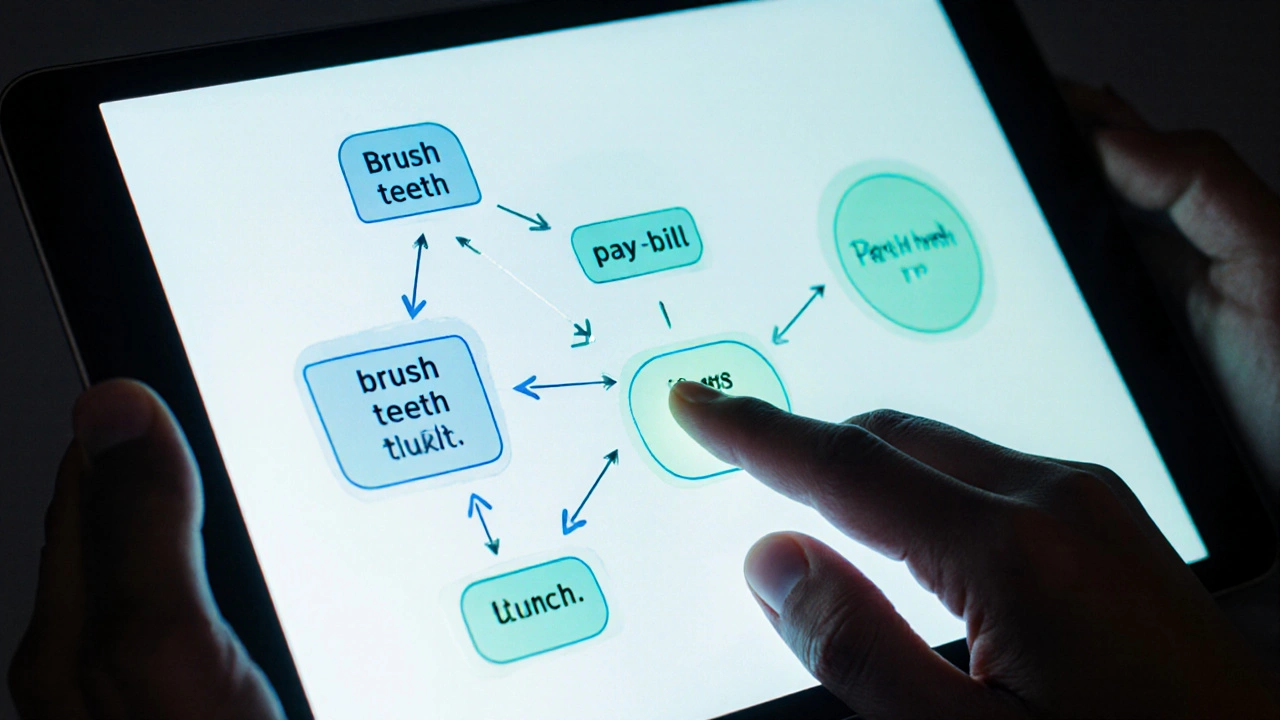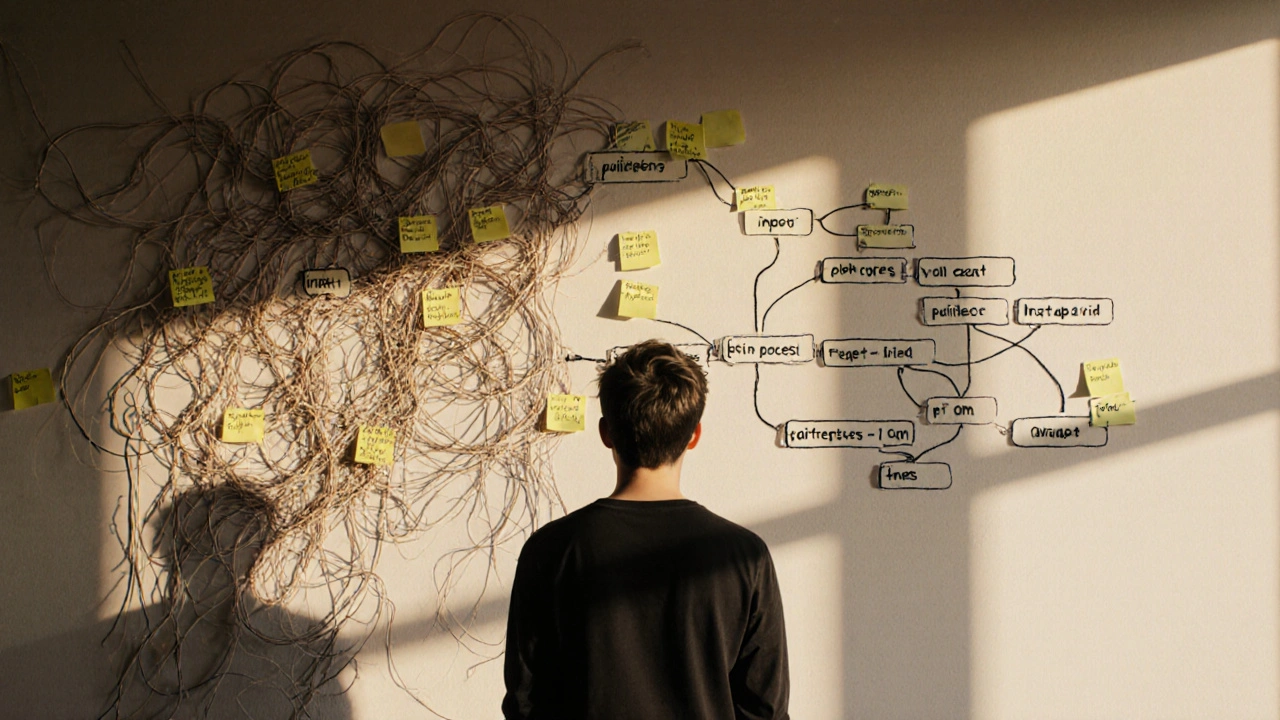Problem Breakdown Tool
Decompose Your Problem
Enter any challenge you're facing. The tool will help you break it into manageable steps using coding principles from the article.
Your System Analysis
Inputs
Process
Outputs
Next Steps
Debugging Tip: Start with the first step that's most likely broken.
System Improvement: Consider adding checks for edge cases like "What if..." scenarios.
Learn more about computational thinkingThink about the last time you faced a messy problem-maybe your phone kept crashing, your budget didn’t add up, or your schedule was a tangled mess. You didn’t just guess your way through it. You broke it down. You tested ideas. You looked for patterns. That’s not luck. That’s problem-solving-and coding trains you to do it better, whether you’re writing software or just trying to fix your Wi-Fi.
Coding Teaches You to Break Things Down
When you write code, you don’t start by building an entire app. You start with one small piece: a button that works, a form that submits, a calculation that adds two numbers. If that piece fails, you don’t throw the whole thing out. You isolate it. You check the inputs. You test the output. You ask: Where did it break?
This habit spills over into real life. Need to plan a trip? Instead of thinking, “I need to go somewhere nice,” you break it into: flights, accommodation, transport, meals, weather, budget. Each becomes a mini-task. That’s computational thinking-taking a big, fuzzy problem and turning it into clear, manageable steps. You don’t get overwhelmed because you’re not trying to solve everything at once.
You Learn to Expect Failure-And Fix It
Every beginner coder gets errors. A lot of them. Missing semicolon. Wrong variable name. Logic that makes sense to you but not to the computer. At first, it’s frustrating. But after a while, you stop seeing errors as disasters. You start seeing them as clues.
That’s a game-changer in everyday life. When your project at work falls apart, you don’t blame the team. You ask: What step went wrong? What assumption was wrong? What data was missing? You don’t panic. You debug. You test one variable at a time. You’ve practiced this with code for hours. So when real-world things go sideways, you’re already trained to stay calm and methodical.
Coding Builds Pattern Recognition
After writing the same kind of loop ten times-fetching user data, validating input, saving to a database-you start noticing patterns. You see that most problems follow similar structures: input → process → output. You learn to recognize when something looks familiar, even if the context is different.
That skill helps you spot trends in your finances, predict traffic jams based on time of day, or even understand why your partner keeps forgetting to take out the trash (hint: it’s not a habit, it’s a reminder system failure). You stop seeing random events. You start seeing systems. And once you see the system, you can change it.

You Get Better at Thinking Ahead
Bad code breaks when something unexpected happens. A user types letters into a number field. The internet drops. The server is down. Good code doesn’t just work-it anticipates failure. It checks for edge cases. It handles errors gracefully.
That mindset changes how you plan. Instead of saying, “I’ll just do it and see what happens,” you ask: “What if this doesn’t work?” What if the supplier delays? What if the app crashes? What if no one shows up? You build backups. You create alternatives. You don’t just react-you prepare. That’s not just smart coding. That’s smart living.
Coding Makes You Less Afraid of Complexity
People often avoid hard problems because they feel too big. A messy room. A complicated tax form. A relationship conflict. They think: “I don’t know where to start.”
Coding teaches you that complexity is just layers of simple things. You don’t need to understand how a car engine works to drive it. You just need to know how to turn the key, press the gas, and steer. Similarly, you don’t need to be a genius to solve a tough problem-you just need to know how to break it into pieces.
Once you’ve stared down a 500-line script that didn’t run and fixed it piece by piece, a messy spreadsheet or a confusing contract doesn’t scare you anymore. You know you can untangle it. You’ve done harder things.
It Trains You to Think in Systems, Not Just Solutions
Most people want quick fixes. Turn it off. Turn it on. Delete the cache. Reinstall. That’s fine for a glitch. But real problems? They come back because the system is broken.
Coding forces you to think beyond the symptom. Why did the app crash? Was it the code? The server? The user input? The database timeout? You don’t just patch it-you fix the root. You build checks. You automate warnings. You make the system smarter.
Apply that to your life: Why do you keep overspending? Is it the app? The habit? The lack of tracking? Why do you always run late? Is it the alarm? The morning routine? The way you plan? Coding teaches you to fix the system, not just the symptom.

Real-Life Examples: Coding Thinking Outside the Code
One person I know started learning Python to automate reports at work. Within months, she started using the same logic to manage her household. She created a simple spreadsheet that tracked grocery spending by category. If she went over budget on dairy, it flagged it. If she bought the same item twice in a week, it reminded her. She didn’t need an app. She built her own system.
Another guy used coding logic to fix his kids’ bedtime routine. Instead of yelling, he created a visual checklist: brush teeth → pick out clothes → read one story → lights out. Each step had a small reward (a sticker). He didn’t change their behavior-he changed the system that triggered it.
These aren’t tech miracles. They’re just people who learned to think like coders: define inputs, set rules, test outcomes, iterate.
You Don’t Need to Be a Developer to Benefit
You don’t have to become a software engineer. You don’t need to learn JavaScript or Python to start thinking this way. Even spending 20 minutes a day on a free platform like Codecademy, freeCodeCamp, or Scratch teaches your brain how to approach problems differently.
Try this: Next time you’re stuck on something-whether it’s organizing your closet or figuring out why your plant keeps dying-write down three things you could test. What’s the input? What’s the expected output? What’s one small change you could make? Then try it. See what happens. Adjust. Repeat.
That’s coding. That’s problem-solving. And it’s not about writing perfect code. It’s about building a mindset that turns chaos into clarity.
Start Small. Think Big.
You don’t need a degree. You don’t need a job in tech. You just need to start treating problems like code: broken, fixable, and worth debugging.
Try writing a simple script that automates one boring task. Or play a logic game like CodeCombat. Or just sit down and map out your weekly routine like a flowchart. Each step builds the muscle. Over time, you’ll find yourself solving bigger problems-not because you’re smarter, but because you’ve trained your brain to see the structure beneath the mess.
Coding doesn’t just make you a better programmer. It makes you a better thinker.
Do I need to learn a programming language to improve my problem-solving skills?
No, you don’t need to learn a full programming language to benefit. The real value comes from learning how to break problems into steps, test assumptions, and spot patterns. Even simple tools like spreadsheets with conditional logic, or free beginner platforms like Scratch or Code.org, train your brain in the same way. It’s about the thinking process, not the syntax.
How long does it take to see improvement in problem-solving?
You can start noticing changes in just a few weeks. After 10-15 hours of structured practice-like completing a beginner coding tutorial or solving 5-10 logic puzzles-you’ll begin to approach everyday problems more systematically. The more you practice, the more automatic it becomes. It’s like learning to ride a bike: the first few tries feel awkward, but soon you don’t think about it-you just do it.
Can coding help with non-technical problems like relationships or finances?
Absolutely. Coding teaches you to treat problems as systems. A strained relationship isn’t just about one argument-it’s about communication patterns, timing, triggers. A budget that keeps failing isn’t about spending too much-it’s about how you track, when you pay, and what reminders you have. By mapping these out like code-inputs, rules, outputs-you can design better systems that prevent the same mistakes from repeating.
What if I’m not good at math? Can I still benefit from coding?
Yes. Coding isn’t about advanced math. It’s about logic, sequencing, and persistence. Most beginner coding tasks involve simple arithmetic, comparisons, and loops-things you use every day when you calculate a tip or plan a route. You don’t need to be a math whiz. You just need to be willing to try, fail, and try again.
What’s the easiest way to start learning coding for problem-solving?
Start with free, visual tools like Scratch or Blockly. They let you drag and drop logic blocks to create simple programs-like making a character move or a timer count down. No typing, no syntax errors. Just cause and effect. After that, try freeCodeCamp’s “Scientific Computing with Python” course. It’s designed for beginners and focuses on real-world problem-solving, not just coding theory.

